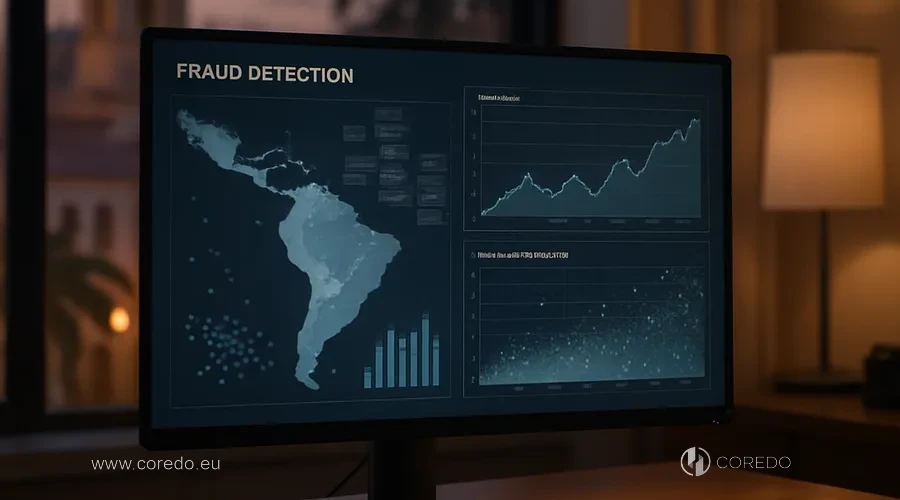Last year the level of financial fraud in Latin America increased by 70% compared to 2022, and the total damage to businesses exceeded $10 billion. In Brazil every third online transaction is subject to a fraud attempt, and in Mexico the number of CNP fraud (card-not-present fraud) cases more than doubled over three years. Why are even large fintech companies and banks in the region vulnerable, and how can businesses protect themselves amid rapid digitalization, a shortage of specialists and constantly changing regulatory requirements?
COREDO’s practice shows: effective combating of fraud requires not universal recipes but a strategic approach that takes into account regional specifics, technologies, legislation and real business risks.
In this article I will analyze in detail the key aspects of fraud management in Latin America, from local threats and regulatory changes to AI implementation and ROI assessment. This is not a theoretical overview but a practical guide based on the experience of the COREDO team, which has implemented dozens of projects for company registration, obtaining financial licenses, AML consulting and building comprehensive fraud prevention systems for businesses in Brazil, Mexico, Peru, Chile and other countries in the region. After reading the article, you will gain strategic ideas and tools for effective management of fraud risks in LatAm, and will be able to make decisions that genuinely protect your business.
Fraud management in Latin America

The rise in attacks and new regulatory requirements make it crucial to understand the key *risks* and *types of fraud* companies in the region face.
Risks and types of fraud
Financial fraud in Latin America is highly dynamic and diverse in its schemes. The most common are:
- CNP fraud: card-not-present fraud, especially relevant for e-commerce and fintech. In Brazil and Mexico the share of CNP fraud in the total volume of payment fraud exceeds 60%.
- Fake invoices – forged invoices and payment details used to steal funds from companies and their clients.
- Social engineering and phishing: attacks on employees and users via fake websites, messaging apps and calls, often exploiting local linguistic and cultural characteristics.
- E-commerce fraud – chargebacks for false reasons, credential theft, recipient substitution.
The COREDO team has repeatedly encountered situations where standard fraud detection tools used in Europe or Asia proved ineffective in LatAm due to the specifics of local scenarios – for example, the mass use of WhatsApp for payments or a high share of unbanked segments without bank accounts.
Country-specific features
- Brazil, the largest market, where Pix scams, deepfake fraud, synthetic identities and schemes with fake QR codes are widespread.
- Mexico – high level of CNP fraud, active use of social networks for attacks, weak KYC infrastructure in some banks.
- Peru – growth in fraud via mobile apps, lack of biometric verification, low user awareness of risks.
Implementation of COREDO solutions for fintech companies in these countries has shown: risk management of fraud in LatAm requires continuous adaptation and consideration of local specifics, from language to payment-system peculiarities.
Impact of the digital economy and fintech
The rapid growth of digital services and the fintech ecosystem in Latin America creates new opportunities for business but also increases fraud risks. Inclusion of unserved segments, mass digital onboarding and the shift to real-time payments (Pix, SPEI) require new approaches to fraud management, integration of AI and machine learning, as well as continuous transaction monitoring.
Legislation on combating fraud in Latin America

Legislation to combat fraud in Latin America is evolving to meet unique challenges: the region faces both traditional economic crimes and new cyber threats. Processes differ between countries, but everywhere fighting fraud requires comprehensive regulations and ongoing adaptation to modern risks.
Key regulatory acts
- LGPD (Brazil) – a data protection law regulating the processing of personal data and requiring implementation of KYC, AML and 2FA for financial services.
- Regulations in Peru and Colombia: tightening AML compliance requirements, mandatory use of digital identification and biometrics for banks and fintech companies.
- Mexico: introduction of new standards to combat fraud in payment systems, mandatory company registration with disclosure of beneficiaries and sources of funds.
The solution developed at COREDO for company registration and obtaining licenses in Brazil and Mexico includes a full compliance audit of LGPD, AML and KYC, which allows clients not only to complete registration but also to minimize the risk of fines and account blocks.
New requirements for transaction security and 2FA
In 2024–2025 most regulators in Latin America tightened requirements for transaction security:
- Mandatory implementation of multi-factor authentication (2FA) for all online operations.
- Biometric verification, mandatory for banking applications and digital onboarding.
- Real-time transaction monitoring: a requirement for fintech companies and payment systems.
COREDO’s experience confirms: successful registration and Licensing of companies in the region are impossible without the integration of modern identification tools and compliance with new AML standards.
Regulators and cooperation with business
Effective fight against fraud is impossible without close interaction between businesses, regulators and law enforcement. In Brazil, Mexico and Peru working groups have been created to exchange information about new fraud schemes, conduct joint investigations and implement unified fraud prevention standards.
The COREDO team regularly participates in such collaborations, helping clients not only meet requirements but also gain access to the industry’s best practices.
Impact of new regulations on fraud prevention
New laws and regulations require businesses to be flexible and ready for constant process updates. The implementation of AI analyzers, adaptive risk scoring, and integration of cloud platforms — all this becomes not just a competitive advantage but a prerequisite for operating in Latin America.
Fraud detection and prevention in Latin America

Fraud detection and prevention in Latin America are becoming increasingly relevant due to the growth of digital financial services and the evolution of fraudulent schemes. Banks, fintech companies and online services are forced to implement modern protection methods to ensure user trust and comply with strict cybersecurity requirements. Below we consider the key technologies and approaches that shape the modern system for combating fraud in the region.
Modern technologies for fraud protection
- AI for fraud detection – machine learning and anomaly detection make it possible to identify complex fraud schemes, including deepfake fraud, synthetic identities and social engineering attacks.
- Adaptive risk scoring: dynamic risk assessment for each client and transaction, integrated with cloud platforms.
- Integration of SaaS solutions – cloud monitoring systems that provide real-time analysis and scalability for rapidly growing businesses.
The COREDO team implemented such solutions for fintech companies in Brazil and Mexico, enabling clients to reduce fraud loss per client by 45% in the first year.
Biometrics, digital identification and KYC with 2FA
- Biometric verification: fingerprints, facial recognition, voice identification.
- digital identification and KYC: automated identity verification procedures, integration with government registries.
- 2FA: SMS codes, push notifications, hardware tokens.
COREDO’s solutions in AML and fraud prevention include comprehensive integration of biometrics and digital identification, which significantly reduces the risks of fake registrations and fraud during digital onboarding.
COREDO’s holistic approach not only increases the security of digital onboarding but also provides reliable protection against fraud at all stages of identification. Next we will look at the capabilities of cloud platforms and the implementation of real-time monitoring.
Cloud platforms and real-time monitoring
- Cloud solutions for fraud monitoring: allow businesses to quickly scale systems, integrate new data sources and provide real-time transaction monitoring.
- Integration with payment networks (Visa, FICO, Experian): access to global databases and analytics tools.
COREDO case: for a large fintech in Peru, integration of a cloud platform with local banks and international payment networks was implemented, which reduced dispute rates by 30% and increased ROI from investments in fraud prevention.
Risks of technology implementation
- Lack of cybersecurity specialists: one of the region’s key problems.
- Scaling complexity – rapidly growing companies face the need for constant system updates and staff training.
- Vulnerabilities of digital onboarding: fake documents, synthetic identities, attacks via mobile applications.
The COREDO team helps clients not only implement technologies but also build training and adaptation processes, reducing risks and ensuring compliance with standards.
Managing fraud risk for businesses in Latin America

Managing fraud risk for businesses in Latin America requires a special approach due to the rapid pace of digitization and the high activity of cybercriminals in the region. Without effective strategies and the implementation of best fraud management practices, companies will find it difficult to protect their assets and maintain customer trust amid unique threats and local market specifics.
Best practices for fraud management
- Multi-layered protection: combination of AI, biometrics, 2FA, KYC and manual auditing.
- Regular process audits – review fraud prevention strategies at least once a quarter.
- Information sharing with industry associations: participation in working groups, access to analytics and fraud detection benchmarks.
COREDO case: for an e-commerce platform in Chile, an automated monitoring system integrated with local and international databases was implemented, which reduced fraud loss per client by 50% over one year.
Metrics and KPIs for evaluating effectiveness
| Metric | Description | Business value |
|---|---|---|
| Fraud loss per client | Average fraud loss per client | Assessment of economic efficiency |
| Dispute rates | Share of disputed transactions | Indicator of fraud prevention quality |
| ROI from implementation | Ratio of savings to investments in technology | Assessment of solution feasibility |
COREDO’s practice has shown: regular monitoring of these metrics allows not only identifying weaknesses but also reasonably justifying investments in fraud management.
Whatto evaluate the ROI of scalable solutions
- Scalability is a key criterion for fast-growing fintech companies and e-commerce.
- Integration of cloud platforms allows rapid expansion of functionality and onboarding of new markets.
- ROI assessment — cost and savings analysis, payback period calculation, comparison with industry benchmarks.
The implementation of scalable COREDO solutions for banks and fintech in LatAm has shown: competent integration of AI and cloud platforms can increase ROI by 30–50% by reducing fraud losses and operational expenses.
Balancing security and user convenience
- User experience: minimizing friction during verification, intuitive interfaces, transparent processes.
- Digital onboarding — automation, fast identification, protection against fake documents.
- Balance of security and convenience: a key factor in customer retention and business growth.
The COREDO team helps clients build processes where security does not hinder convenience, but instead becomes a competitive advantage.
Fighting fraud in e-commerce
- Integration of fraud detection with payment gateways — automatic transaction verification, behavior analysis.
- Use of AI to detect anomalies: preventing CNP fraud, fake invoices, returns for fraudulent reasons.
- Cooperation with payment networks, data sharing, joint investigations.
COREDO practice: for a large online retailer in Brazil, an AI-analytics system was implemented that reduced CNP fraud by 40% in 6 months.
Impact of cryptocurrencies on fraud management in Latin America

The impact of cryptocurrencies on fraud management in Latin America is becoming increasingly significant, as the rapid adoption of digital assets creates new opportunities not only for economic growth but also for abuse and fraud. In conditions of weak regulation and heterogeneous control standards, the field of fraud management faces fundamentally new challenges that are important to consider when analyzing cryptocurrency risks.
Cryptocurrency risks
- Cryptocurrency money laundering, using digital assets to conceal sources of funds.
- Fraud in cryptocurrency transactions: fake ICOs, phishing platforms, wallet attacks.
- Growth of A2A fraud — fraud in account-to-account transfers, especially via Pix and similar systems.
COREDO’s AML and fraud prevention solutions for cryptocurrency companies in LatAm include automated transaction monitoring, integration with global databases, and staff training on new fraud schemes.
Cryptocurrency money laundering and protection methods
- Transaction anonymity: complicates identification of fund sources.
- Need to integrate KYC and AML, automate identity verification, monitor transaction chains.
- Cooperation with regulators, information sharing, joint investigations.
The COREDO team implemented projects to register cryptocurrency companies in Brazil and Mexico, taking into account new AML requirements and integration of digital identification.
Impact of new payment methods
- Pix (Brazil), SPEI (Mexico): increased speed and transaction volume, new fraud schemes.
- A2A fraud, attacks on direct transfers, alteration of payment details, phishing.
COREDO recommendations: implementation of real-time monitoring, integration of AI analyzers, training of staff and users.
Minimizing cryptocurrency risks
- Comprehensive AML and KYC, automation, integration with global registries.
- Staff training: regular training sessions, exchange of experience with industry associations.
- Implementation of AI analyzers: detecting anomalies, preventing fraudulent schemes.
Challenges and prospects of fraud management in Latin America
Fraud management in Latin America faces unique challenges: the rapid digitalization of financial services leads to an increase in complex fraud schemes, and regional specifics and varying maturity of regulatory approaches make unified protection standards difficult. These challenges shape the current prospects for the development of fraud management systems, from the adoption of new technologies to increased demand for qualified personnel and interbank cooperation.
Shortage of qualified specialists
impact on business, increased training costs, difficulties in implementing new technologies, decreased effectiveness of fraud prevention.
The COREDO team helps clients build training and knowledge-sharing processes, integrating best practices and international standards.
Need to update systems
- New threats — deepfake fraud, synthetic identities, ransomware.
- adaptation to changes: regular system updates, integration of new data sources, cooperation with industry associations.
COREDO’s practice confirms: only continuous development and adaptation allow businesses to remain protected.
Technology development and collaboration
- Growth of investments in AI and cloud solutions; the fraud prevention market in Latin America is forecasted to double by 2027.
- Collaboration between businesses and regulators, joint projects, information sharing, implementation of unified standards.
The COREDO team participates in international initiatives, helping clients implement best practices and technologies.
Importance of information exchange and collaboration
- Data exchange — creation of common registries, sharing analytics, joint investigations.
- Cooperation with industry associations — access to best practices, training, experience sharing.
The implementation of COREDO solutions for banks and fintechs in the region has shown: information exchange is a key factor in improving the effectiveness of combating fraud.
Conclusions and recommendations for entrepreneurs and executives
- Fraud management in Latin America is not a set of tools, but strategica process requiring the integration of technologies, compliance with regulatory requirements and continuous learning.
Practical steps:
- Implement AI and machine learning to analyze transactions and detect anomalies.
- Integrate biometrics, digital identification, and 2FA to enhance security.
- Use cloud platforms for scalability and real-time monitoring.
- Regularly audit processes and train staff.
- Collaborate with regulators and industry associations, and participate in information sharing.
- Assess the effectiveness of fraud prevention using key metrics (fraud loss per client, dispute rates, ROI).
- Ensure a balance between security and user convenience, minimizing friction during digital onboarding.
When choosing technologies and partners, give preference to solutions that integrate AI, cloud platforms, and comply with international AML and KYC standards. COREDO’s experience shows: such solutions provide not only regulatory compliance but also real protection for the business.
Compliance with legislation and risk minimization – regular audits, integration of new requirements, and training of staff and users.
A balance between security and convenience is the key to retaining customers and growing the business.
This approach allows our clients not only to protect their business, but also to create new opportunities for growth in the region’s digital economy.